Media - News
- Media
- APCEL Conference Explores a Just Transition in Southeast Asia
APCEL Conference Explores a Just Transition in Southeast Asia
Fighting climate change requires some radical economic and social transformations. In Southeast Asia, a “just transition” to a low-carbon future is seen to be particularly challenging. Rapid economic development, social inequalities and high climate vulnerability lead to the conclusion that there is no one-size-fits-all model.
To facilitate the discovery of solutions that will promote a just transition in Southeast Asia, APCEL organized a full-day convening on 7 August 2025. Bringing together experts from academia, government, civil society, business and international organizations, the convening sought to unpack explore how the concept of a “just transition” can be understood and implemented in Southeast Asia and beyond.
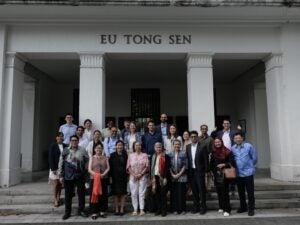
In her opening remarks, APCEL’s Director Jolene Lin pointed out that the concept of a “just transition” was increasingly recognized as a legal necessity, particularly in light of the International Court of Justice’s recent Advisory Opinion on Climate Change. She also stressed that “just transition cannot happen in vacuum,” highlighting the challenge of translating this concept into practical, people-centered solutions that address local socio-economic contexts. Attendees were encouraged to share challenges and bold ideas, in the hope that the dialogue will inform meaningful policies and laws for a fair and sustainable future.
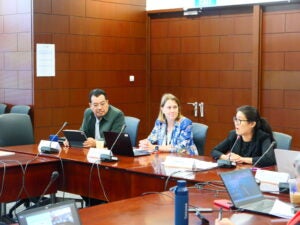
The day’s deliberations took place across three thematic panels, each tackling a key dimension of the “just transition.”
Panel 1: Aligning the Perceptions of Just Transition: The Need for Local Solutions to a Global Problem
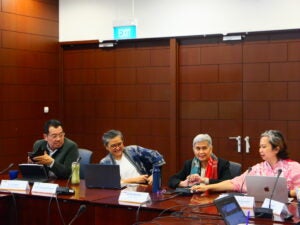
The first speaker, Professor Raphael Heffron of the University of Dundee, offered a global perspective on the evolving concept of a just transition and the role of international frameworks in shaping it. He described “just transition” as a journey or a pathway which is different for each country, but the core principle must be inclusivity and technological transformation.
The second speaker, Golly Ramos, Founding and Former Vice President of Oceana Philippines, brought a regional and grassroots perspective. She highlighted the gap between the Philippines’ progressive climate law and their weak implementation, citing illegal mining in protected areas and the Bulacan airport reclamation as examples. She also shared a success story from Daram, Samar, where community-driven, science-based fisheries management is improving livelihoods and offering a replicable model for a just transition.
The next speaker, Kuki Soejachmoen, Executive Director of Indonesian Research Institute for Decarbonization (IRID), stressed that both decarbonization and climate resilience should be addressed in a just transition. She also emphasized the importance of localizing strategies and engaging communities to ensure solutions fit their own cultural, economic, and environmental realities.
The fourth speaker, Suripno, spoke on behalf of Indonesia’s state-owned energy enterprise, Pertamina. Suripno described Pertamina’s “dual growth strategy” as seeking solutions that reduce greenhouse gases without sacrificing energy security. It also focused on reskilling the workforce
to ensure that no one is left behind in the transition period and emphasized “no stranded assets.” This means that the state-owned enterprise assets will be properly managed throughout the process of reducing greenhouse gas emissions.
This first panel was moderated by Dr. Linda Yanti Sulistiawati, Senior Research Fellow of APCEL and Associate Professor of Law at University Gadjah Mada.
Panel 2: Just Transition and the Rule of Law: The Roles of Regulations and Governance
The second panel was also moderated by Dr. Sulistiawati. The discussion examined how legal frameworks, governance structures, and regulatory reforms can protect rights and guide equitable climate action.
Laode Syarif (University of Hassanudin) argued that justice must come before transition. He warned that legal rollbacks, weak enforcement and entrenched corruption can easily undermine Indonesia’s strong constitutional environmental rights on paper. He called for stronger climate governance, transparency and accountability to ensure that the rule of law truly supports a just transition.
Fabby Tumiwa from Institute for Essential Services Reform (IESR) emphasized that just transition must go beyond energy systems to address all sectors where change disrupts livelihoods, insisting on the principle of no one left behind. He called for multi-level governance and legal safeguards that account for diverse, often marginalized groups from coal-dependent communities to informal workers.
Leonard Simanjuntak (Greenpeace Indonesia) framed just transition through the lens of political economy. He warned that vested interests and oligarchic capture can undermine Indonesia’s path toward a fair and sustainable energy future. Without political will, transparency, and genuine public participation, he argued, a just transition will remain out of reach.
Miza Razali of Tenaga Nasional Berhad (TNB), Malaysia’s largest state-owned energy enterprise, stressed that successful just transition governance must align with national policy, be rooted in strong, evolving institutional frameworks, foster close stakeholder engagement, and drive proactive capacity building. To this end, TNB offers training not only internally but also to suppliers, addressing emerging technical needs.
Panel 3: Just Transition and Finance: The Role of Financial Institutions
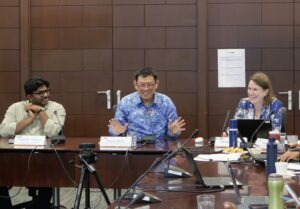
This panel was moderated by Ghislaine Nadaud, APCEL Visiting Researcher and Director of Sustainable Investing at Robeco. Drawing on her expertise in aligning investment strategies with social and environmental imperatives, she led a discussion on how financial institutions can mobilize capital not only to accelerate decarbonization, but also to promote social equity, inclusive economic growth, and the protection of human right.
Eugene Wong (CEO, Sustainable Finance Institute Asia) highlighted ASEAN’s pioneering transition taxonomy and transition finance guidance, frameworks designed to bridge climate ambition with social inclusion and economic realities. He stressed the need for practical, context-sensitive pathways, stronger safeguards, and greater capital mobilization to ensure that no community is left behind in Southeast Asia’s shift to a low-carbon future.
Sangeeth Selvaraju, Policy Fellow (India and ASEAN) from the Just Transition Finance Lab, pointed out that Southeast Asia must first define the scope of “just transition” finance and clarify whether it’s limited to addressing social impacts like job losses or encompasses a broader low-carbon development strategy. This choice shapes the mix of public, private, and blended finance, which in the region is constrained by limited fiscal space. He urged focusing funding on tangible community benefits and leveraging the untapped potential of state-owned enterprises to support the transition.
Chaitra, who leads the Just Transition Working Group at the Asia Investor Group on Climate Change, spoke about the role investors can play in advancing a just transition, with a particular focus on the social dimension. She stressed that social outcomes like reskilling, safety nets, and benefit-sharing must be built into investment strategies and highlighted the importance of “place-based” approaches, where transition strategies are tailored to the local context, workforce, and economy. Her Philippines case study illustrated how avoiding displacement, securing indigenous consent, and creating community funds can align economic development with social justice in transition projects.
Belinda Hlatshwayo (Business and Human Rights Project Manager, UNDP Bangkok Regional Hub) highlighted the need for financial institutions to integrate human rights and environmental due diligence into just transition efforts. She stressed that “just” must be clearly defined, covering not only worker rights but also broader community and consumer protections, and that transparency, stakeholder engagement, and grievance mechanisms are essential to build trust with civil society. Citing examples from BNP Paribas and ABN AMRO, she showed how meaningful engagement can bridge the gap between ambition and reality. She also noted increased legal risks following the ICJ advisory opinion, underscoring the urgency for institutions to break down silos between climate, social, and human rights work.
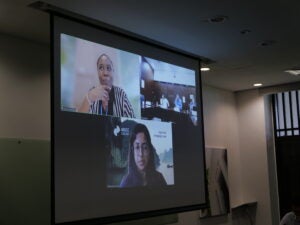
A clear message resonated across all three panels: people, not just energy systems or climate targets, must be at the heart of a Just Transition. Human well-being, equity, and dignity are the ultimate measures of success.
The Q&A was lively, and the discussion underscored that collaboration is non-negotiable: law, finance, local agency, and international cooperation must work in concert to ensure Southeast Asia’s climate transition leaves no one behind. APCEL intends to continue its efforts to contribute to this important dialogue.

